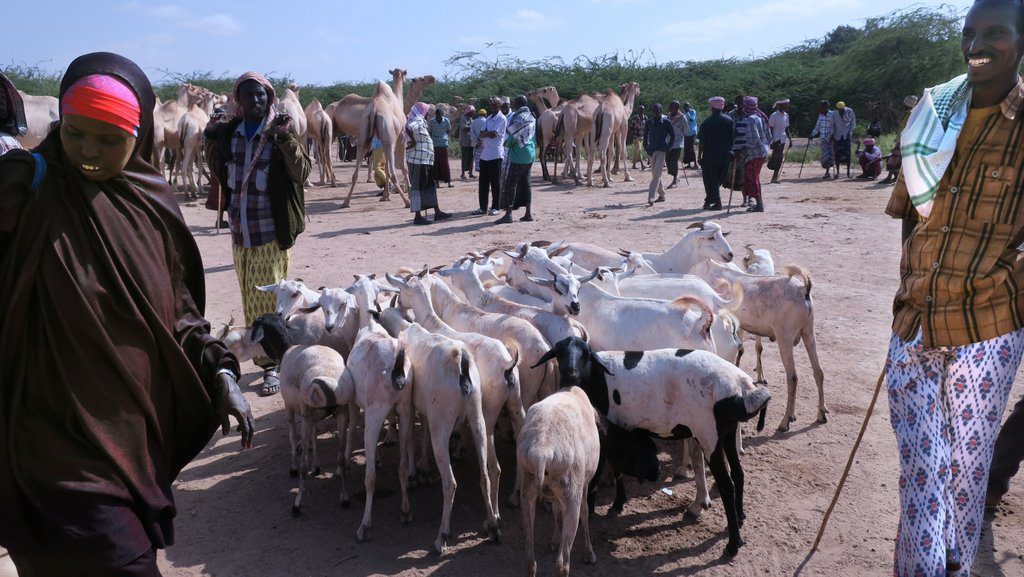This article was first published in the December, 2016, issue of the Red Cross Red Crescent magazine.
Saadiya Ahmed* raises a small axe and splits a butchered goat’s leg in two. Then, with remarkable deftness, she cuts the meat into smaller chunks. One of the female butchers at Daraawista market in Beletweyne, Somalia, Ahmed aims to achieve a regular income by selling one goat per day.
“It will enable me to pay my household bills and take my children to hospital when they fall sick,” says Ahmed, who settled in Beletweyne after fleeing Mogadishu, leaving her extended family behind. With children to feed, she used the only money she had to venture into the meat business.
Most of the stalls in the Daraawista market are run by women, who arrive as early as 6 in the morning to sell firewood, charcoal, vegetables or meat. With all the chopping and loud bargaining, the meat section is the noisiest place in the market — just one sign of the vibrant livestock trade in Beletweyne, Somalia’s fourth-largest city. The town hosts two livestock markets and four slaughter compounds, and work begins well before daybreak.
The animals are slaughtered on bare ground and cleaned with water from the River Shabelle, which cuts across the town. There are no meat inspections and the meat is transported on donkey carts directly to the traders.
With health and hygiene an obvious concern, the ICRC will this year support more than 400 women butchers with training on hygienic meat handling and kits that contain a set of knives, gloves, two aprons and a wheelbarrow. Nearly 50 of these women, Ahmed included, are from Beletweyne.
‘’The majority of the women butchers have not received any training on meat handling,’’ says Massimo Zecchini, ICRC’s livestock specialist in Somalia. “Hygienic meat preparation can reduce illnesses from preventable food-borne diseases.’’
In addition, ICRC livestock specialists have been training community animal health workers in livestock disease control so they can offer animal health services to people in remote and inaccessible pastoralist areas. The ICRC has also built three livestock veterinary clinics staffed by veterinary officers and equipped with analysis laboratories. Three more are currently under construction.
‘’Frequent veterinary consultations and availability of good-quality drugs are two ways to ensure the community eats and sells healthy meat,” says Zecchini. “The animals will also produce more milk. In the long run the animals will sell for a higher price at the market, increasing family income.”
All these efforts aim to maintain the health of people already suffering from a range of hardships — from floods to cyclical droughts, displacement and ongoing conflict. But they also help protect the health of the local food market and the livelihoods and local commerce it supports.
Many challenges
Favorable as business may seem at this bustling market, the women of the Daraawista market face many challenges. Many are single parents, having lost their husbands due to the conflict.

Women butchers sell meat in Daraawishta market, Beletweyne. They will receive training from the ICRC on hygienic and safe procedures of meat preparation. ©ICRC/Rita Nyaga
With the number of households in which women are the main providers increasing in the last 20 years, women here are among the most vulnerable, yet are very resilient, managing small businesses, raising children, and playing a critical role in the stability of local markets and social fabric. Many, for example, live with and support orphans and the elderly in their communities.
“By running small businesses like teas shops and butcheries, they contribute to the economy in both rural and urban settings,’’ says Dusan Vukotic, ICRC’s coordinator of relief programs in Somalia. ‘’We support them with business skills training to run their preferred type of business.’’
For single mothers, juggling the role of breadwinner and parent is particularly difficult. Saadiya recalls how one evening she returned home to find her youngest child had fallen and seriously injured his head. She rushed him to a hospital, where she spent the next six months taking care of him.
Two days after her son’s fall, police came looking for Saadiya because the owner of her stall at the market thought she had left town without paying rent. Even though her child was still in the hospital, she had to return to work. Saadiya opened her stall for six hours each day, went home to cook for her other children, then spent the night with her son in the hospital. He has since recovered, but the episode provides a small glimpse of some of the great challenges women here confront.
By Rita Nyaga
Rita Nyaga is a communications assistant in the ICRC Somalia delegation
*name has been changed to protect her privacy.


